Do Deer Eat Carrots? (Deer Farmers Answer)
» Deer stories » Do deer eat » Do Deer Eat Carrots? (Deer Farmers Answer)As deer farmers, we get asked these questions a lot: what vegetables can deer eat, including whether they enjoy carrots.
When discussing deer, we primarily refer to our Fallow Deer species, closely related to the White-tailed Deer, which is widespread throughout much of the United States. And when we talk of carrots as a potential food source for deer, we refer to cultivated carrots from gardens or wild-growing carrot varieties.
Do Deer Like to Eat Carrots?
Easily answered: yes! You'd be hard pressed to find a deer who refuses a carrot.
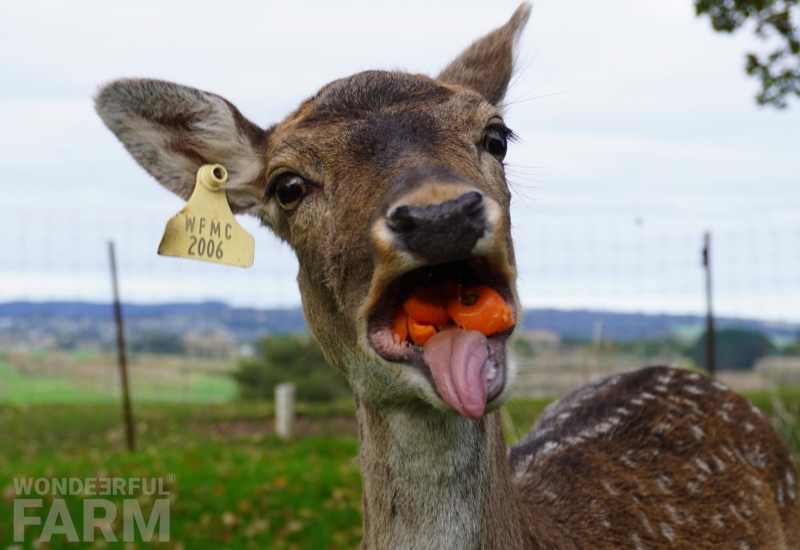
That's the short answer. But wait, there's more! :) As usual, there are nuances to cover around the subject of either attracting these animals, or - keeping them away from your harvest. And of course, when and how to feed deer in your area if you love to help wildlife. Gardeners, nature lovers and deer hunters will all find useful insights below.
Are Carrots Good for Deer?
While deer's natural diet consists mainly of leaves, twigs, and shoots, they are capable of adapting to new food sources when they become available. This is evident in their ability to digest and enjoy carrots, even though they're not a typical food source for these animals.
🥕Carrots are a nutritious and beneficial food source for deer of all species, be they whitetail or fallow or mule, providing them with a variety of important vitamins and minerals that are essential for their health and wellbeing.
Some of the key health benefits of carrots for deer include:
|
We've been supplementing our deers' diet with carrots for years and have seen no negative effects. Only happy deer who are enjoying these sweet, crunchy vegetables. Carrots are sometimes said to have way too high sugar levels to be included in deer rations, but as long as they comprise only a small portion of their daily menu, and the rest of the food they consume is versatile and low in sugar, these animals will rip benefits of consuming carrots.
The trick is knowing how to 🥕 safely introduce carrots into deers' diet. Read on, and you will learn about that.
Do Carrots Attract Deer?
Carrots are a popular vegetable for many home gardeners, but if you live in an area with a large population of deer, it can be a struggle to keep these hungry herbivores from munching on your hard-grown harvest. Deer are attracted to the sweet, earthy smell of carrots and their ability to dig up the roots from the ground only makes the task of keeping them away even more challenging.
The sweet aroma of carrots is irresistible to deer. When they catch a whiff of these tasty vegetables growing in a garden, they will be attracted to the area and will do everything they can to get their fill.
If a herd of deer enters your property, they can quickly decimate your carrot crop. These animals have voracious appetites, and they won't hesitate to eat all of the carrot plants in sight. This can be a frustrating experience for gardeners who have put in a lot of time and effort to grow their carrots. If you have a large herd of deer in your area, it may be nearly impossible to keep them from eating your harvest, unless you get it properly fenced.
Due to their highly developed sense of smell, deer are able to detect the scent of carrots from great distances. In fact, a typical species of deer has a sense of smell that is approximately 1,000 times more powerful than our own, with deer having around 250 million scent receptors compared to our meager 5 million. [ source ]
Deer have evolved their sense of smell to aid them in locating food and detecting potential predators, and it is this ability that guides them as they move to different areas in search of sustenance. This is particularly true during the winter months when food sources are scarce, and deer must travel long distances to find enough to eat.
So, to summarize, yes, deer are attracted to carrots and can definitely smell them from miles away. If you want to attract deer, carrots are a surefire way to do it.
How To Tell if Your Carrots are Eaten by Deer
So, you think some sneaky deer are munching on your precious carrot garden, huh? Well, don't worry, there are ways to confirm these carrot-crazed culprits are the real deal!
First, keep an eye out for some tell-tale signs. Look for some deer droppings and hoofprints. Sure, their poop might look similar to a rabbit's, but deer tend to leave their dung in one tidy pile. We're happy to help with the visuals btw, because we've got loads of that stuff at the farm!
[warning: graphic! deer poop pics!]
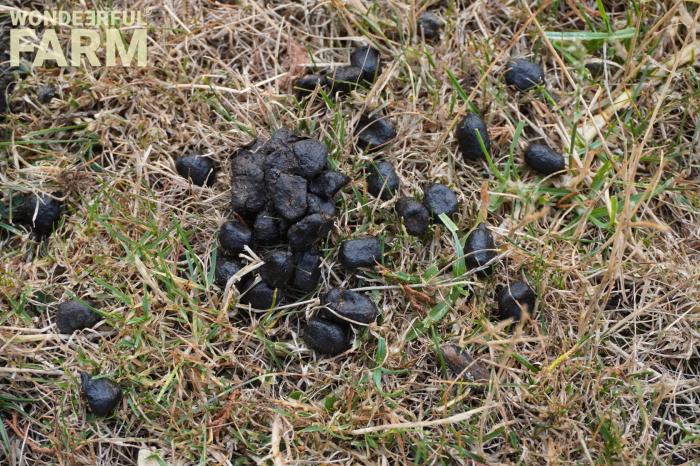
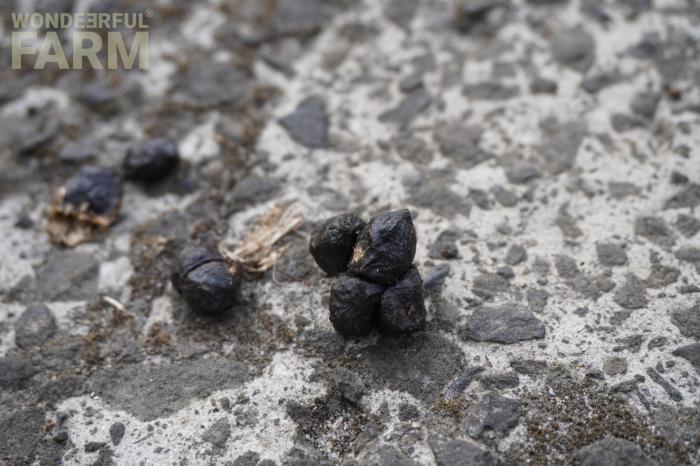
Deer hoofprints are pretty distinctive, so if the ground is a little wet or dry, you can spot them easily.
Second, check out the surrounding area. Deer are big boys and girls, weighing in at a hefty 180 pounds, so they're not exactly graceful. If you see some flattened plants or grass nearby, it's a good chance that a wild deer (or some other large animal) was here.
How to Keep Deer Away from Carrots?
Some gardners have reported success with covering the low-growing crops with metal wire cages, which protects them from rabbits, too.
We have written an extensive overview post on deer deterrance methods, in which we review the effectiveness of everything from companion plants, to smelly soaps, sprinklers, lights, hedges and more. Read it here. But long story short, and sorry to be the bearer of bad news, but unless you build a really tall fence that deer can't jump over, most gardeners have a tough time keeping deer out of their gardens.
How to Safely Feed Deer Carrots?
So now that we know deer can eat carrots, question is, should you feed them to deer? This is where things get trickier because while being beneficial in general, even wild carrots are not a staple for these herbivores. Deer have this issue of digestive tract's inability to cope with drastic unexpected dietary changes. Sudden introduction of any new substance, be it corn, apples, bread or carrots can have a very negative impact on animals' health. It typically takes up to 3-4 weeks for these mammals to adapt to a certain diet, and any suddenly introduced different type of food can disrupt it in a bad way, from diarrhea to death from acidosis. So the main thing about safely feeding deer carrots is easing them into these.
🦌 There is this one widely available food you could share with wild deer more safely than carrots (any other season than winter), and that is oats. 🦌
But is it even a good idea to feed wild deer carrots?
Well, if one of your fridges always looks like this, feeding deer might be the right choice for you:
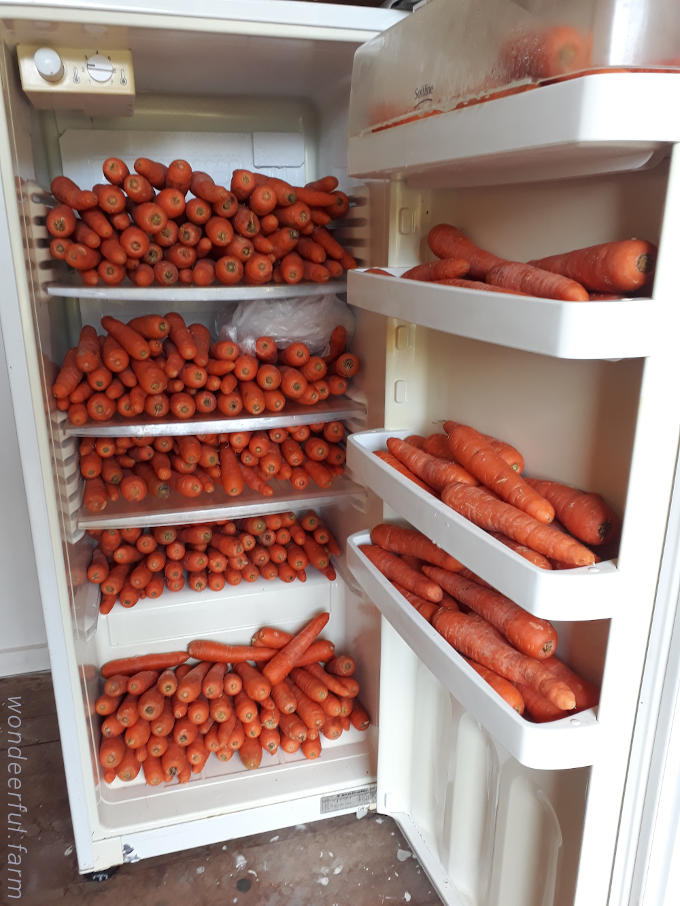
But normally, feeding carrots, or any other human food, to wild deer is not a good idea. Here's why:
- Firstly, feeding wild deer can alter their natural feeding behavior and may cause them to become reliant on handouts, which can lead to health problems and a reduced ability to find natural food sources. This can be particularly problematic during the winter months, when deer are more reliant on natural food sources to survive. Supplement feeding deer in winter months is a big responsibility and a lot of dedication. Nobody benefits if you throw an occasional bag of carrots (or other feed) and forget about the deer later. They'll keep coming long distances to your spot, burning precious calories, and then finding nothing, thus you'll let them down. If you start feeding in winter - you must continue all the way to spring. Also, it's even more dangerous for their digestive system as it's attuned to a very simple winter diet and lacks bacteria to process anything else. Introducing carrots slowly is key.
- Secondly, feeding wild deer can cause them to congregate in unnatural locations, which can increase the spread of diseases, such as chronic wasting disease, which can be transmitted through close contact between animals.
- Thirdly, feeding feral deer can also pose a safety risk to humans, as deer that become too accustomed to human presence may become aggressive or cause property damage in their search for food. Traffic accidents involving deer may increase.
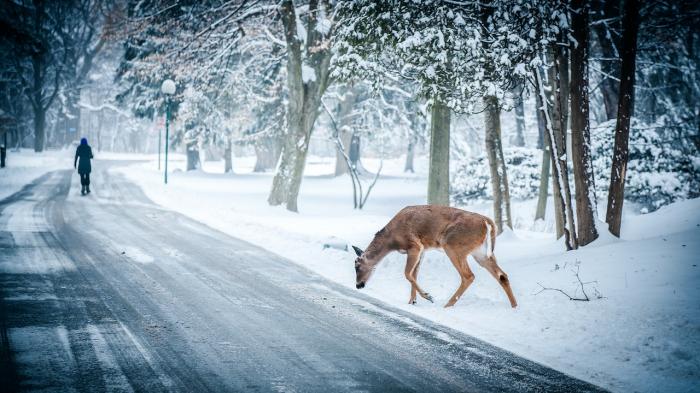
Photo by Snapwire
In some areas, feeding wild deer may simply be illegal, as it can cause problems for wildlife management and conservation efforts.
If you are concerned about the welfare of wild deer, the best way to help is to protect and enhance their natural habitat by supporting conservation efforts and reducing the impact of human activity on wildlife areas. Trees and shrubs are hugely important for deer. It's not only food but shelter. If you wish to provide supplemental food for deer, it is best to do so in consultation with local wildlife authorities or under the guidance of a wildlife rehabilitation expert.
And if you had the expectation that wild deer would take food from your hands after a month or so, you are likely to be disappointed. It could take almost a year of daily interactions for deer to develop that level of trust with you.
Let's be real here: deer have been around for a hot minute, and they've been doing fine without us handing out snacks. So, don't feel like you gotta be the savior for these critters during the winter. They're tough as nails and know how to hustle for their next meal, regardless of the season.
Can Fawns Eat Carrots?
Fawns should not be introduced to supplemental foods too early because of their developing digestive system. They generally depend on their mother’s milk for the first 3 to 4 months of their lives. The key to helping baby deer thrive is feeding their mothers!
On our farm, some fawns get to eat carrots. They never get too much though because their position in pecking order is low and adult deer grab themselves any treats first. If we want to offer a certain fawn a bit of carrot, we can do so, and they happily accept, but they don't get much more than an inch at first.
Do Deer Eat Carrot Tops?
Oh, they sure do! Both the tops and the roots will be enthusiastically consumed by deer. In our experience, actually, deer might even prefer carrot tops (stem, foliage), they go absolutely mad over them. We once offered these freshly dug small carrots to our deer and they gobbled up the leafy part first.
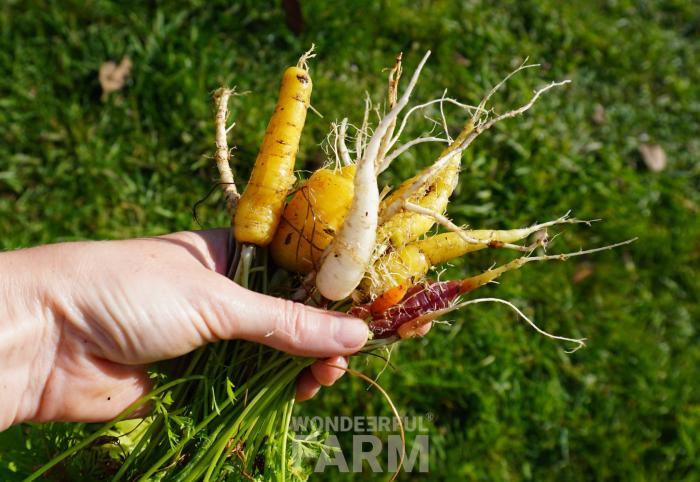
So gardeners beware, if deer don't have time to dig out the whole crop, they'll destroy it by munching on the stalks only. And no, if you're feeding deer you don't need to remove carrot stalks.
Can Deer Eat Cooked Carrots?
They can. However, unless we're talking plain carrots boiled in water, please don't feed deer any commercially processed ones (canned, pickled etc) as they may contain unwanted addittives, the effects of which on the animals are unknown.
What Other Fruit and Veg Can Deer Eat?
Read our overview post 'What do deer eat'.
Deer will eat practically anything when food supplies are low, but otherwise, besides carrots,
Deer adore:
- apples
- berries, especially blueberries and blackberries, strawberries
- bananas
- nuts
- pears
- plums
- sweetcorn
Deer also quite enjoy:
- sweet potatoes,
- beets,
- beans or broccoli,
- pumpkin,
- leafy greens, spinach,
- cauliflower,
- turnip,
- peas,
- celery.
We find citruses and cabbages are not on top of their list but deer will eat them if there's no better alternative, even lemons, whole.
Not fans of onion, garlic and fennel, although our 'gourmets' didn't mind some garlic toast.
Carrot Use in Deer Food Plots
Planting carrots for deer can have several benefits, including:
- Nutritional Value + Deer Attracting Potential: Both discussed above.
- Adaptability to Soil: Carrots can be grown in various soil types, including sandy soil, making them a suitable option for many areas.
- Complementary Planting: Carrots can be planted in the spring, and turnips can be planted in the fall, providing a year-round food source for deer in the area.
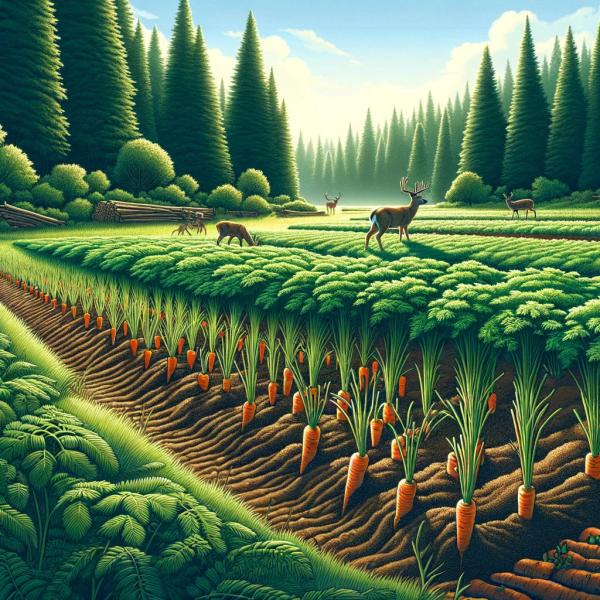
Overall, planting carrots for deer can contribute to their nutritional intake and serve as an effective attractant, especially in sandy soil conditions.
If you search the web, you might come across this Michigan Sportsman forum posting, where the user tells how he successfully grew carrots, despite being initially told by experts that it couldn't be done. However, they faced challenges such as deer damaging the crop. The remaining carrots, particularly those planted in rye, are thriving. The forum user found that leaving the tractor and tiller in the barn and opting for semi-natural plots with careful consideration yielded the best and longest-lasting results. They also observed that the more their plot resembled a natural environment, the less it attracted deer. The author emphasized the satisfaction of growing carrots, suggesting that a successful carrot harvest can alleviate concerns about other crops for the entire season.
Why do Deer Adore Carrots?
Well, these orange veggies are like a tasty snack for them. They love munching on all parts of the carrot, even yanking them right out of the ground. Even though carrots might not be the most nutritious, wholesome food for deer, they still contain several beneficial nutrients that these animals need and deer can't get enough of them.
Deer love carrots because of their sweet taste, which can be enjoyed raw or cooked. Since deer are herbivores, they have no problem digesting carrots. So, no matter what color carrots you have in your garden, they'll attract deer all the same. With their sweet flavor and easy-to-digest nature, it's no wonder deer love chewing on them so much!
To sum up: Deer love to eat carrots, both wild carrots and garden-grown carrots. But since it's not a typical and primary food source for these mammals in nature, deer need to be introduced to carrots gradually. The whole carrot, together with stalk is edible. Both raw and cooked kinds, where cooked means - prepared by yourself - boiled or baked without spices (salt is fine). When feeding wild deer for the purpose of trying to help them survive winter or thrive in general, you should first learn how to feed deer safely. Carrots contain many beneficial nutrients, but are not a staple food source (not wholesome food that deer could survive off of). For garden owners deer may become a problem, but there's ways to identify deer damage and protect your carrot crops from these pests.
Do you have any other questions for us regarding feeding deer 🥕🥕🥕? Feel free to ask in the comments section below.
Last modified 14 February 2024 at 14:27
Published 26 February 2020
Add your comment
More «Do deer eat» stories
Leave the Deer Their Daily Bread!
In the wake of coronavirus panic, our deer bread lovers are experiencing some disappointment. They would like to ask fellow New Zealanders to chill and leave more bread on the shelves. Should you feed deer bread?
read more...
Would you like ketchup on that?
Today, deer were eating pasta for the first time. Well, to be fair, they might've tried a bit a couple times before, but only some of them, it wasn't something we'd cook for them. Until this day. The spaghetti day!
read more...
What Do Deer Eat?
What do deer eat in the winter? What do deer like to eat the most? Is it ok to feed deer 🦌? Find out whether deer can eat different kinds of food (alphabetical index).
read more...
 '
'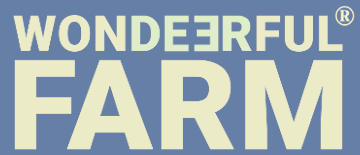
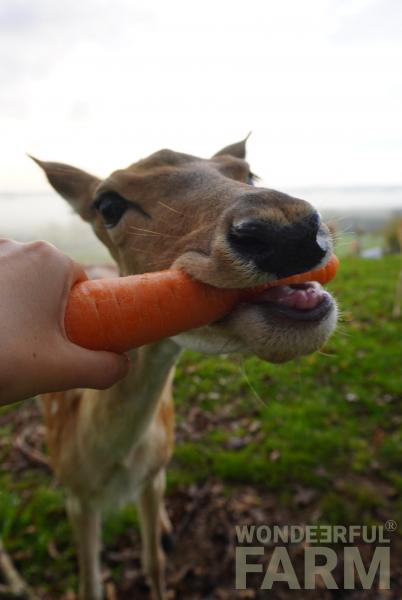
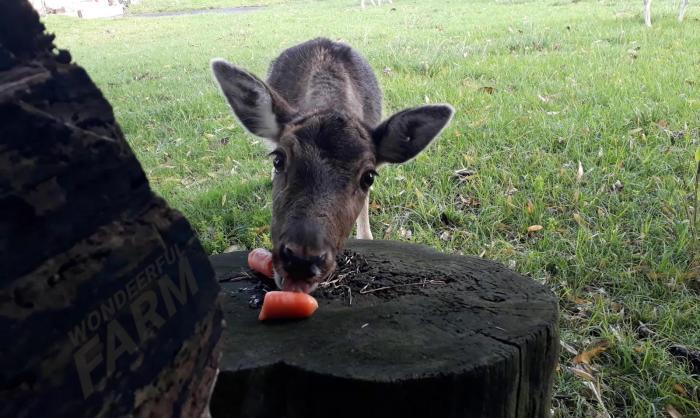
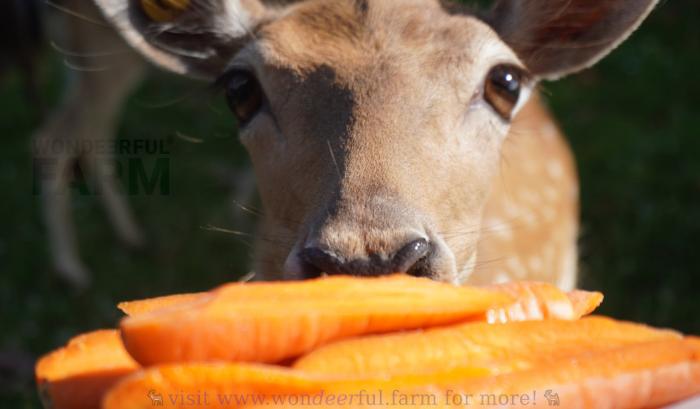
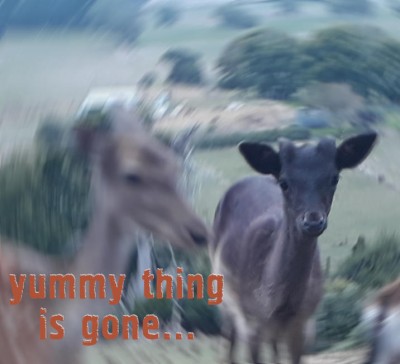
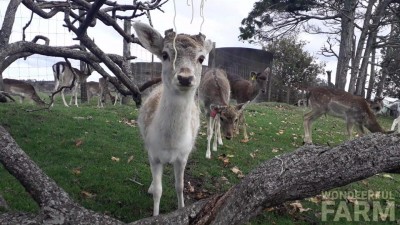
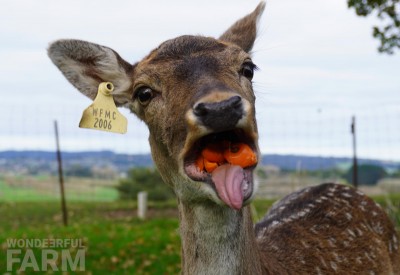
Shelly 26-01-2023:
Hello I have 50 to a 75lbs bag of carrots for deers. Please help to give these away